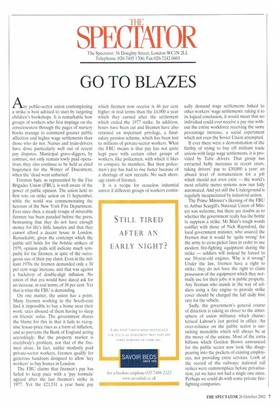GO TO BLAZES
Ally public-sector union contemplating a strike is best advised to start by targeting children's bookshops. It is remarkable how groups of workers who first impinge on the consciousness through the pages of nursery books manage to command greater public affection and higher wage settlements than those who do not. Nurses and train-drivers have done particularly well out of recent pay disputes. Municipal grave-diggers, by contrast, not only remain lowly paid operatives; they also continue to be held as chief bogeymen for the Winter of Discontent, when the dead went unburied'.
Fireman Sam, as represented by the Fire Brigades Union (FBU), is well aware of the power of public opinion. The union held its first vote on strike action on 11 September, while the world was commemorating the heroism of the New York Fire Department. Ever since then, a steady troupe of miserable firemen has been paraded before the press, bemoaning that they do not have enough money for life's little luxuries and that they cannot afford a decent house in London. Remarkably, given the contempt which the public still holds for the boishie strikers of 1979, opinion polls still indicate much sympathy for the firemen, in spite of the outrageous size of their pay claim. Even in the militant 1970s the firemen demanded only a 30 per cent wage increase, and that was against a backdrop of double-digit inflation. No union of that era would have dared ask for an increase, in real terms, of 38 per cent. Yet that is what the FBU is demanding.
On one matter, the union has a point. Many firemen working in the South-east find it impossible to buy a home near their work: tales abound of them having to sleep on friends' sofas. The government shares the blame for this in that it fails to recognise house-price rises as a form of inflation, and so prevents the Bank of England acting accordingly. But the property market is everybody's problem, not that of the firemen alone. In fact, unlike modestly paid private-sector workers, firemen qualify for generous handouts designed to allow 'key workers' to buy homes in London.
The FBU claims that firemen's pay has failed to keep pace with a 'pay formula' agreed after the last firemen's strike in 1977. Yet the £21,531 a year basic pay which firemen now receive is 46 per cent higher in real terms than the £4,000 a year which they earned after the settlement which ended the 1977 strike. In addition, hours have been cut and firemen have also retained an important privilege, a finalsalary pension scheme, which has been lost to millions of private-sector workers. What the FBU means is that pay has not quite kept pace with certain other groups of workers, like policemen, with which it likes to compare its members. But then policemen's pay has had to rise faster because of a shortage of new recruits. No such shortage exists of firemen.
It is a recipe for ceaseless industrial unrest if different groups of workers contin ually demand wage settlements linked to other workers' wage settlements: taking it to its logical conclusion, it would mean that no individual could ever receive a pay rise without the entire workforce receiving the same percentage increase, a social experiment which not even the Soviet Union attempted.
If ever there were a demonstration of the futility of trying to buy off militant trade unions with large wage settlements, it is provided by Tube drivers. That group has extracted hefty increases in recent years, taking drivers' pay to £30,000 a year: an absurd level of remuneration for a job which should not even exist — the world's most reliable metro systems now run fully automated, And yet still the Underground is regularly incapacitated by industrial action.
The Prime Minister's likening of the FBU to Arthur Scargill's National Union of Miners was welcome, but there are doubts as to whether the government really has the bottle to suppress a strike. Mr Blair's tough words conflict with those of Nick Raynsford, the local government minister, who assured the firemen that it would be 'quite wrong' for the army to cross picket lines in order to use modern fire-fighting equipment during the strike — soldiers will instead be forced to use 50-year-old engines. Why is it wrong? Under the law, firemen have a right to strike; they do not have the right to claim possession of the equipment which they normally use for their jobs: it is public property. Any fireman who stands in the way of soldiers using a fire engine to provide strike cover should be charged the full daily hire rate for the vehicle.
Sadly, the government's general course of direction is taking us closer to the atmosphere of union militancy which characterised Labour's last period in office. An over-reliance on the public sector is sustaining monoliths which will always be at the mercy of the unions. Most of the extra billions which Gordon Brown announced for the public sector now look like disappearing into the pockets of existing employees, not providing extra services. Look at the record of the railways: national rail strikes were commonplace before privatisation; yet we have not had a single one since. Perhaps we could do with some private firefighting companies.


















































































 Previous page
Previous page